Did you know? Nearly 70% of homeowners say that an upgraded garage floor epoxy solution transformed their workspace and increased property value. If you're looking to protect your concrete floors and boost curb appeal, this comprehensive guide covers everything you need—from comparisons with garage floor paint and epoxy flooring, to expert tips and real-life results. Don’t let your garage floor hold your home back—discover solutions that save you time, money, and stress.
Unlocking the Value of garage floor epoxy: Why It’s More Than Just a Floor
When you think about garage upgrades, your mind may jump to new cabinets, storage racks, or maybe even custom lighting. But the true foundation of an organized, investment-worthy space is often overlooked: garage floor epoxy. Unlike simple floor paint or other temporary floor coatings, epoxy floor systems create a durable barrier against stains, oil, chemicals, and the infamous hot tire pickup that ruins lesser floors. The result is a stunning, high-performance garage floor that not only looks incredible but adds genuine value to your property.
It’s not just about visual appeal, either. Choosing the right epoxy coating or garage floor coating means upgrading the way you use your space every day. Homeowners report easier cleanups, less time spent worrying about oil stains or tire marks, and an immediate boost in pride when entering their garages. With options tailored to different budgets, styles, and traffic levels, the right epoxy flooring can redefine your storage space, workshop, or even home gym. Don’t settle for a cracked, dull surface when garage floor epoxy can deliver both beauty and peace of mind.
"Nearly 70% of homeowners say that an upgraded garage floor epoxy solution transformed their workspace and increased property value."
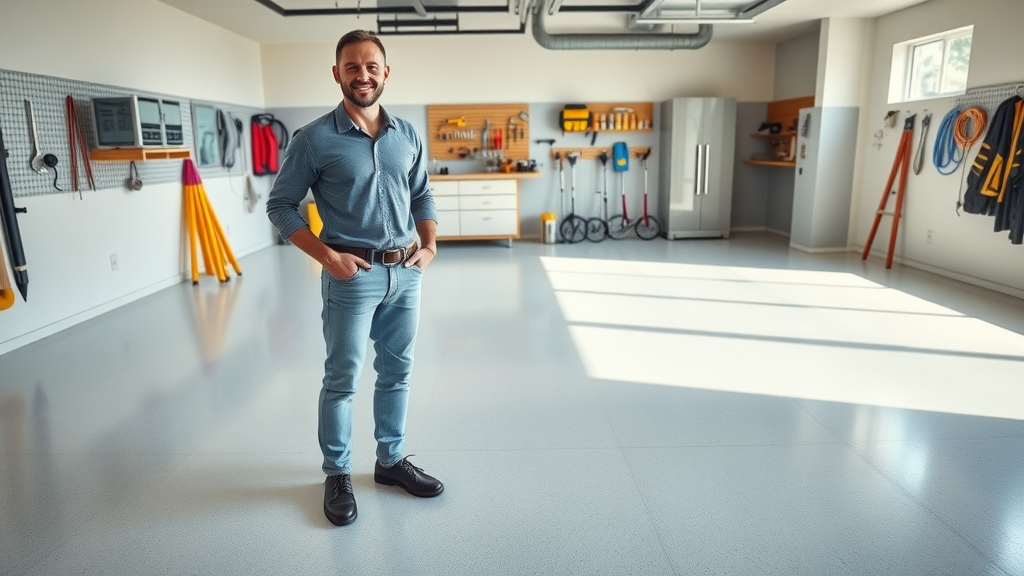
What You’ll Learn About garage floor epoxy
- Key benefits of garage floor epoxy and floor coating
- Differences between garage floor epoxy, garage floor paint, and epoxy flooring
- Pricing details for various garage floor epoxy solutions
- Step-by-step process for choosing the right garage floor epoxy
- Top expert tips to extend the lifespan of your garage floor coatings
The Benefits of garage floor epoxy for garage flooring
Garage floor epoxy offers a host of benefits that go far beyond ordinary garage flooring solutions like basic concrete or floor paint. One of the top selling points is durability: a professionally installed epoxy floor resists spills, stains, and even tough automotive chemicals better than almost any other option. Hot tire pickup—a common problem where the heat of your tires lifts off paints or cheap coatings—is virtually eliminated with a quality floor epoxy system. That means you won’t see peeling or tire marks that can ruin the appearance of your investment.
Epoxy coatings are also *incredibly versatile*. Whether you want a matte finish for a subtle look, a high-shine floor that reflects light throughout your garage, or even a bold full broadcast system with texture and color chips for slip resistance, you’re set. These coatings work on home and commercial concrete floors, offering protection and style for showrooms, workshops, and busy garages alike. With a well-installed garage floor epoxy or epoxy garage floor, daily cleaning is easy—just sweep or mop, and spills are no match for the sealed surface.
- Durability against spills, stains, and tire pickup
- Resists hot tire pickup and chemicals
- Versatility—suitable for home and commercial concrete floors
- Available in multiple finishes—matte, high-shine, full broadcast
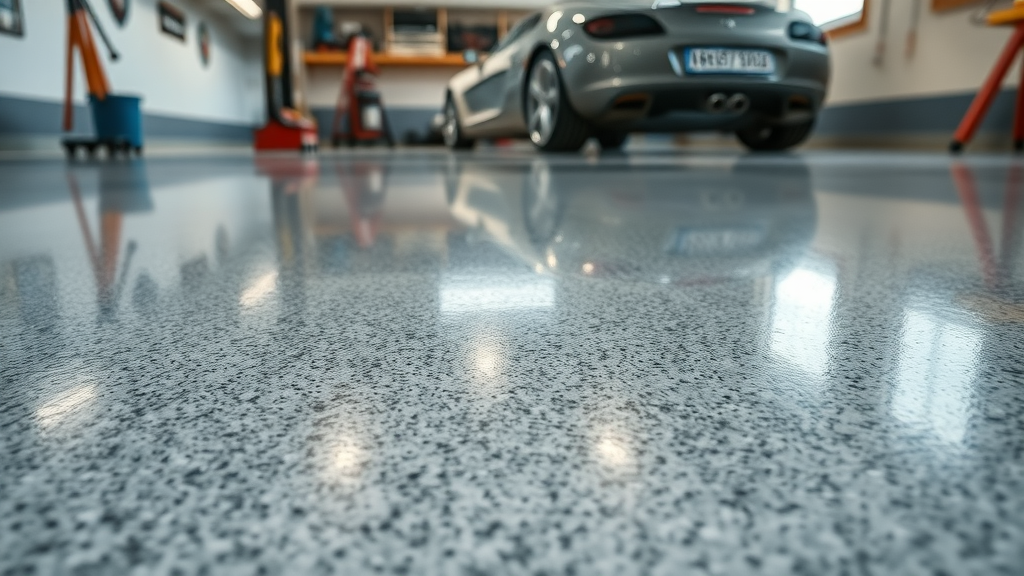
garage floor epoxy vs. Other Solutions: garage floor paint, epoxy floor, & More
Comparing garage floor paint, floor coating, and floor epoxy
Choosing the best solution for your garage flooring means understanding the differences between garage floor epoxy, epoxy floors, floor coatings, garage floor paint, and regular floor paint. While basic paints may seem like a quick fix, they typically offer little protection and can suffer from hot tire pickup or peeling under normal vehicle use. Epoxy floor systems, especially solids epoxy or based epoxy options, outperform in durability, longevity, and chemical resistance, making them a smart investment for high-traffic garage floors.
A quality floor coating means less maintenance, greater resistance to oil stains and chemicals, and a polished look that lasts for years. Application differs dramatically: while garage floor paint is DIY-friendly, professional epoxy coating requires careful surface prep and multi-step cures for maximum strength. In short, garage floor epoxy is a long-term solution that pays for itself through durability and enhanced appearance, while paints and cheap coatings are often “Band-Aid fixes” prone to early failure.
| Product | Avg. Cost (per sq ft) | Durability | Longevity | Application Process |
|---|---|---|---|---|
| Garage Floor Epoxy | $3–$12 | Exceptional – resists stains, hot tire pickup | 10–20 years | Professional prep, multi-layer, cures hard |
| Epoxy Floor | $3–$12 | Outstanding – industrial grade | 10–20 years | Requires expert mixing, multi-day process |
| Floor Coating | $2–$8 | Good – moderate chemical & stain resistance | 5–8 years | Simple application, fewer prep steps |
| Garage Floor Paint | $1–$3 | Moderate – prone to cracking, peeling | 1–3 years | DIY-friendly, single coat application |
| Floor Paint | $0.75–$2 | Poor to moderate – for light use only | 1–2 years | DIY application, minimal prep |
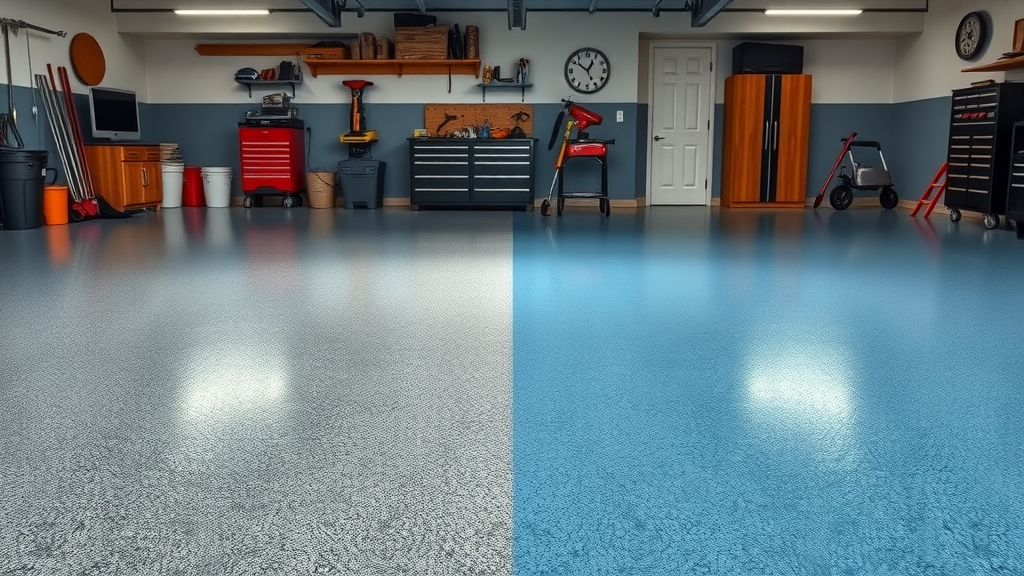
Types of garage floor epoxy: Solids, Water-Based, and Full Broadcast
Selecting the right garage floor epoxy type is critical for longevity and utility. Solids epoxy coatings stand at the top—they’re 100% solids, meaning thick protection, superior adhesion, and unbeatable resistance to heavy traffic and chemicals. If you run a busy workshop or want an industrial-grade epoxy floor that handles anything, go for solids. Water-based epoxy formulas, by contrast, are easier to apply and clean up—a great pick for DIYers or spaces where extreme durability isn’t needed.
The full broadcast system, often seen in high-end or commercial garage flooring, incorporates decorative chips (for a speckled effect) and increased slip resistance, ideal for wet climates or garages used as play spaces. Each system delivers a waterproof, easy-clean surface but excels in different scenarios, so consider your typical garage floor traffic, climate, and desired aesthetic before choosing.
- Solids epoxy: Maximum durability for garage floors
- Water-based epoxy: Easier application and cleanup
- Full broadcast system: Enhanced slip resistance and style
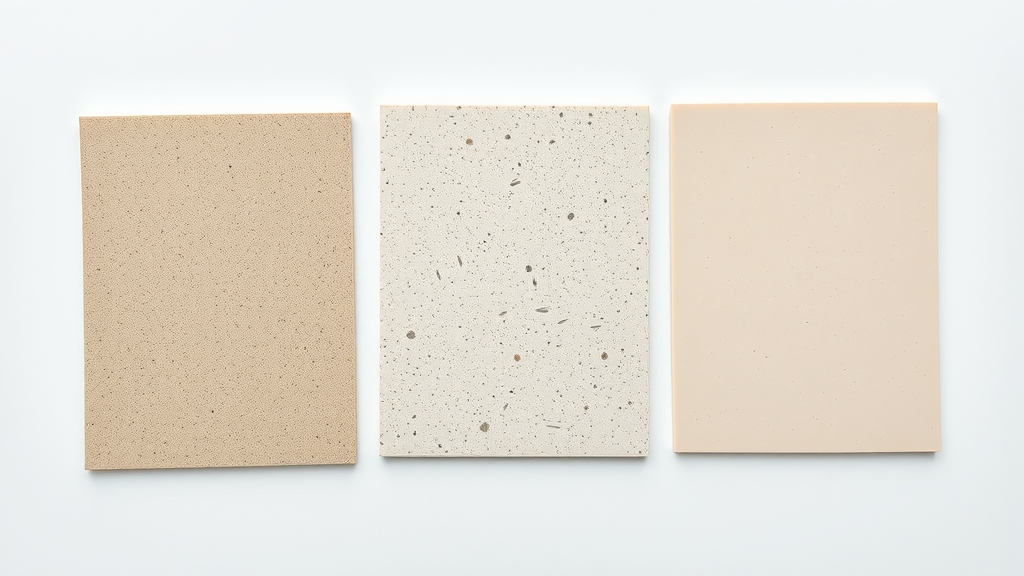
garage floor epoxy Pricing: How Much Will Your Epoxy Garage Floor Cost?
One of the most common questions homeowners have is, “How much will a garage floor epoxy system cost me?” The answer depends on a few key factors: the size of your garage, the type of epoxy coatings you choose, the complexity of your project, and whether professional installation is required. On average, expect to spend anywhere from $3 to $12 per square foot for a high-quality epoxy garage floor. This price often includes materials, surface prep, and labor, especially for larger or more specialized floor coatings.
Homeowners with a standard two-car garage (about 400 square feet) typically invest between $1,200 and $4,800 for a complete surface makeover, depending on the finish and preparation needs. Premium systems—like solids epoxy with full broadcast options—may edge higher in cost but offer unmatched performance and longevity. While garage floor paint or DIY kits may look more affordable upfront, they can peel or wear out, making professional epoxy coating the most cost-effective long-term choice.
How much does it cost to epoxy a 20x20 garage floor?
A typical 20x20 car garage is 400 square feet. Applying a professional-grade garage floor epoxy to this area generally runs between $1,200 and $4,800. The final price hinges on the quality of materials (solids vs. water-based epoxy), the amount of surface prep and repairs necessary, and whether you choose enhancements like the full broadcast coating system. Remember: investing more upfront in proven epoxy floors delivers lasting value, fewer headaches from tire pickup or stains, and better resale potential for your home.
What Are the Downsides of Epoxy Garage Floors?
While garage floor epoxy scores high in durability, style, and ease of cleaning, it's important to be aware of potential drawbacks. Installation of epoxy coatings is labor-intensive, requiring careful surface prep and multiple steps for optimal adhesion and performance. Cutting corners can lead to issues like peeling, poor cure, or hot tire pickup—so professional help is recommended. Additionally, epoxy can be susceptible to UV fading if exposed to direct sunlight for prolonged periods, so indoor garages fare much better than driveways.
Another consideration is moisture: improperly prepared or damp concrete floors may prevent the coating system from bonding fully, resulting in bubbles or delamination. And while epoxy garage floor options resist most chemicals, harsh impacts or dragging metal objects could chip or scratch the surface over time. However, when professionally installed and properly maintained, these issues are rare and easily mitigated—making garage floor epoxy a top-tier choice for most homeowners.
What are the downsides of epoxy garage floors?
The main concerns with epoxy flooring are the need for thorough surface prep, the risk of peeling or bubbles if improperly applied, limited UV stability, and potential vulnerability to sharp impacts or heavy abuse. Remediation usually involves professional repair or recoating, emphasizing why prep and professional installation are critical for flawless, long-lasting epoxy floors.
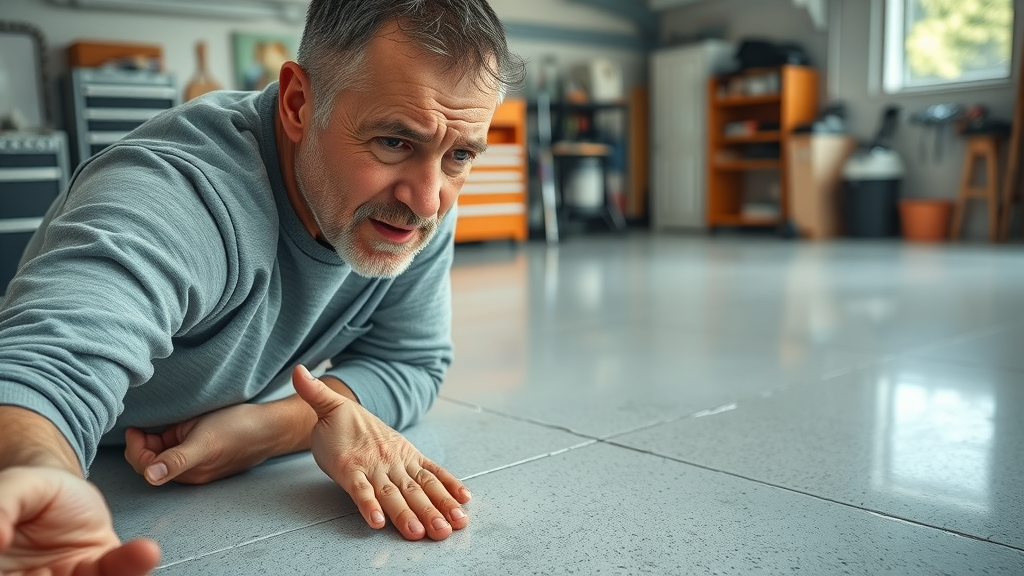
Is Garage Floor Epoxy the Best? Exploring Alternatives
While garage floor epoxy is a leading solution for homeowners and pros, it's not the only viable option in today’s market. For those desiring even faster cure times and extended UV/weather resistance, polyaspartic floor coatings have emerged as a competitive alternative. Polyaspartics deliver similar (or better) chemical and abrasion resistance, cure in just hours, and retain gloss even in sunlit garages.
However, many homeowners find epoxy coating systems to be the best blend of affordability, proven durability, and accessibility with decades of proven use. Compare your climate, garage use, and investment goals before choosing. For most indoor applications with standard vehicle use, garage floor epoxy remains the gold standard for lasting protection and appeal.
What is better than epoxy for a garage?
Polyaspartic coatings can be superior for some users due to their rapid cure, excellent UV resistance, and flexibility. However, epoxy garage floor systems still lead for value, long-term strength, and versatility, especially when considering the needs of most concrete garage floors.
Calculating Coverage: How Many Gallons for a 2 Car Garage?
One key step in planning your garage floor epoxy installation is knowing how much product you’ll actually need. As a rule of thumb, 1 gallon of 100% solids epoxy floor coating covers approximately 100–150 square feet at full thickness. For a standard two-car garage (about 400–500 square feet), you’ll need 3 to 5 gallons for a base coat—more if you’re adding a second coat, decorative chips, or a clear topcoat. Water-based epoxy coatings may stretch a bit further but tend to result in a thinner finished layer.
Don’t forget to account for surface irregularities, cracks, and absorbency, as rougher or older floors may require more material. Purchasing a little extra ensures an even, professional finish without thin spots. When in doubt, consult a pro for precise square footage conversions and best results.
How many gallons of epoxy do I need for a 2 car garage?
For most two-car garages (400–500 square feet), budget 4–5 gallons of high-solids or water-based garage floor epoxy to ensure complete, protective coverage of your concrete floors.
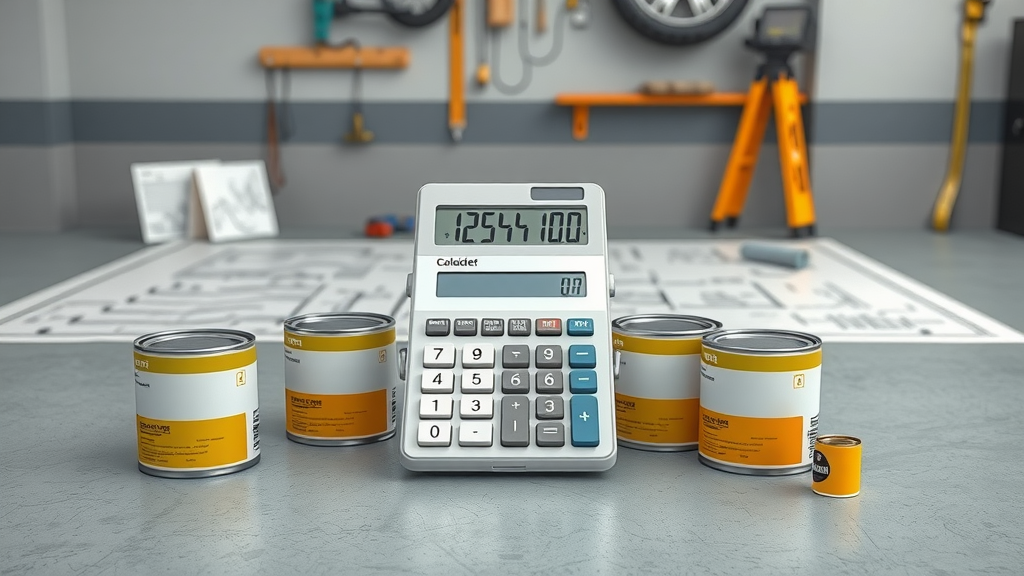
How to Choose the Right garage floor epoxy for Your Concrete Floors
To get the longest lifespan and best performance, assess your concrete’s current state and think about your garage’s main purposes. Smooth, intact surfaces are ideal for epoxy garage floor application, while cracked or damp concrete floors may need remedial surface prep or moisture mitigation first. Your usage also matters: for high-traffic spaces, workshops, or areas exposed to frequent vehicle use, opt for solids epoxy or full broadcast coating systems for maximum resilience.
Consider special needs like slip resistance, resistance to hot tire pickup, or achieving a designer finish. If you want a simpler install for light use, water-based epoxy coatings may suffice. Consult an epoxy floor expert to match traffic level, finish style, and application method to your needs for superior results and satisfaction.
- Assessing the surface: concrete floor conditions
- Key indicators for floor epoxy and floor coating suitability
- Prioritizing slip resistance, hot tire resistance, and finish
Step-by-Step: Preparing and Applying Your garage floor epoxy
Proper application of garage floor epoxy is a multi-step process that guarantees durability and finished beauty. Rushed or skipped steps can result in a failed floor coating—don’t cut corners! Here’s how the pros do it:
- Clean and prep concrete floors
- Patch cracks and surface imperfections
- Prime for best epoxy adhesion
- Mix and apply garage floor epoxy in measured layers
- Complete with a full broadcast or topcoat option
Each stage, from cleaning and degreasing to patching holes and priming, builds the base for lasting epoxy floors. Mixing and applying the epoxy coating evenly (and quickly, due to pot life constraints) ensures a uniform, strong, and sleek finish ready for years of use.
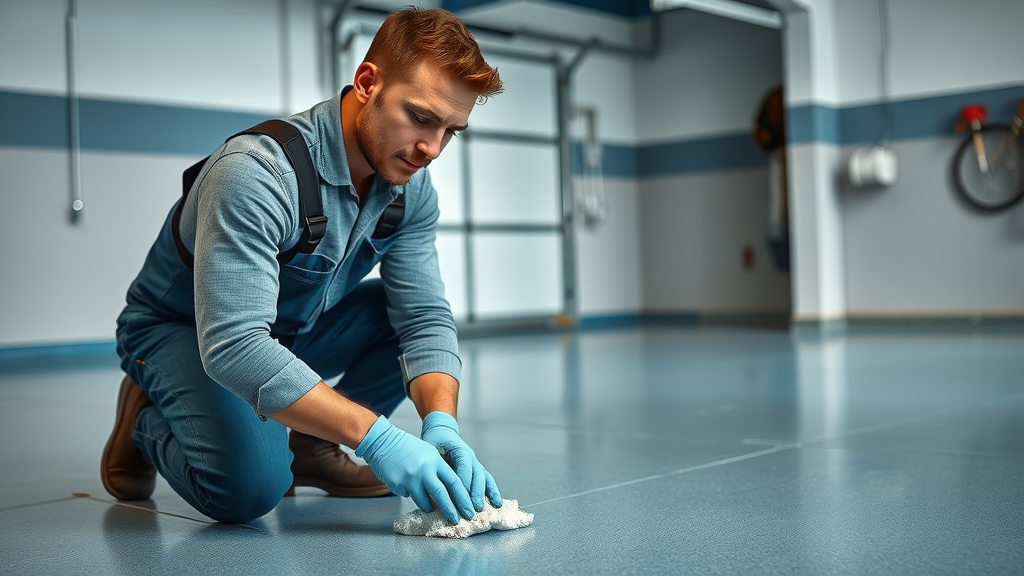
The Science Behind Durable Epoxy Garage Floors: Expert Insights
What makes a garage floor epoxy system so tough? The magic is in chemistry: when properly mixed and applied, the resin and hardener in an epoxy coat undergo a chemical reaction, crosslinking into a virtually impenetrable shield for your concrete. This science is backed by decades of real-world testing on both residential and commercial garage floors. Additives like colored chips (for appearance and slip resistance) or full broadcast quartz can further tailor performance to your needs.
Expert installers know that temperature, humidity, and meticulous surface prep are key. That’s why successful epoxy garage floor installations often come with multi-year warranties and why professional guidance is so valuable. Invest in the right materials and process—the added lifespan and protection for your garage floor will speak for itself.
"A professional garage floor epoxy coating can extend your garage’s lifespan by more than a decade compared to unprotected concrete floors."
Garage Floor Epoxy Maintenance Tips to Avoid Hot Tire Pickup and Stains
Maintaining your garage floor epoxy isn’t complicated, but smart habits will prevent hot tire pickup, stains, and dullness. Sweep or mop dust and debris regularly. Oil, salt, and harsh chemicals should be cleaned up as soon as possible to avoid long-term damage. For spills, use mild soap and warm water—abrasive scrubbers are rarely necessary thanks to the nonporous epoxy floor finish. If your floor is high traffic, reapply a clear topcoat every few years to keep it strong and glossy.
- Routine cleaning best practices
- Dealing with oil, salt, and chemical spills
- How to avoid hot tire pickup
To avoid hot tire pickup, wait at least 72 hours after epoxy coating application before parking. Whenever possible, don’t spin or drag tires over the surface, and clean up rubber and asphalt transfers quickly. With these easy routines, your garage flooring will shine for years.

Customer Reviews: Real Experiences with garage floor epoxy Solutions
Homeowners rave about their upgraded garage floors: Many emphasize not only the instant “wow” factor but how much easier daily cleanup became. “It’s a transformation,” reviewers report. “We store bikes, tools, lawn gear, and nothing leaves stains.” Others highlight the peace of mind—no more worries about tire pickup, oil stains, or high foot traffic. A recurring theme? The pride that comes with a truly finished garage and the way it elevates property value and daily utility.
"I was amazed—my new epoxy garage floor stands up to everything, including heavy tools and the kids’ bikes!"
With hundreds of five-star testimonials, it’s no wonder that garage floor epoxy is one of the most recommended upgrades for homeowners seeking long-term value, durability, and curb appeal.
FAQs on garage floor epoxy and Garage Floor Coating Solutions
-
How do I clean garage floor epoxy?
Clean your garage floor epoxy with a dust mop or soft broom for everyday dirt. For spills or stains, use mild soap and warm water—no harsh scrubbing needed thanks to the nonporous surface. Avoid abrasive cleaners and always wipe spills promptly for best results.
-
How long does epoxy flooring last?
When installed correctly, epoxy flooring can last 10–20 years or more, especially with regular cleaning and periodic topcoat maintenance. High-traffic or commercial garages will trend toward the 10-year mark, while residential uses often exceed two decades.
-
Can I apply garage floor epoxy myself or should I hire a pro?
DIY installation is possible with water-based systems and small areas, but for best adhesion, looks, and longevity, professional installation is highly recommended—especially for larger garages or when using solids or full broadcast systems.
-
What is a full broadcast epoxy system?
A full broadcast system incorporates decorative chips or quartz for enhanced slip resistance and style, fully covering the surface before sealing with a clear topcoat. This offers industrial-grade durability and a designer appearance.
-
Will garage floor epoxy crack or peel?
Properly installed and maintained garage floor epoxy resists cracks and peeling. Problems occur mainly when prep is rushed, humidity is high, or poor materials are used. For lasting performance, trust an expert and follow aftercare guidelines.
Key Takeaways: Choosing and Maintaining Your garage floor epoxy
- Garage floor epoxy drastically enhances strength and appearance
- Proper installation and care maximizes the value of your floor coating
- Selecting the right type is crucial for your needs—compare solids, water-based, and full broadcast
- Seek professional guidance for best long-term results
Conclusion: garage floor epoxy—Invest Now for Immediate and Lasting Returns
Don’t put off upgrading your garage. Garage floor epoxy delivers instant visual appeal, safer surfaces, and a real boost to your home’s value—making it a smart move for any homeowner.
Professional time-lapse installation of an epoxy garage floor, close-ups of each application step, visually demonstrating prep, coating, and the final result.
Call us now to get your free quote!!
Enhancing your garage with an epoxy floor offers numerous advantages, including durability, ease of maintenance, and aesthetic appeal. For a comprehensive understanding of these benefits, consider exploring the following resources:
-
“7 Clear Benefits of Epoxying a Garage Floor” (ultahome.com)
-
“6 Benefits of Epoxy Garage Floors” (onedayfloors.com)
These articles provide in-depth insights into how epoxy flooring can transform your garage space, offering both functional and visual enhancements.
 Add Row
Add Row  Add
Add 

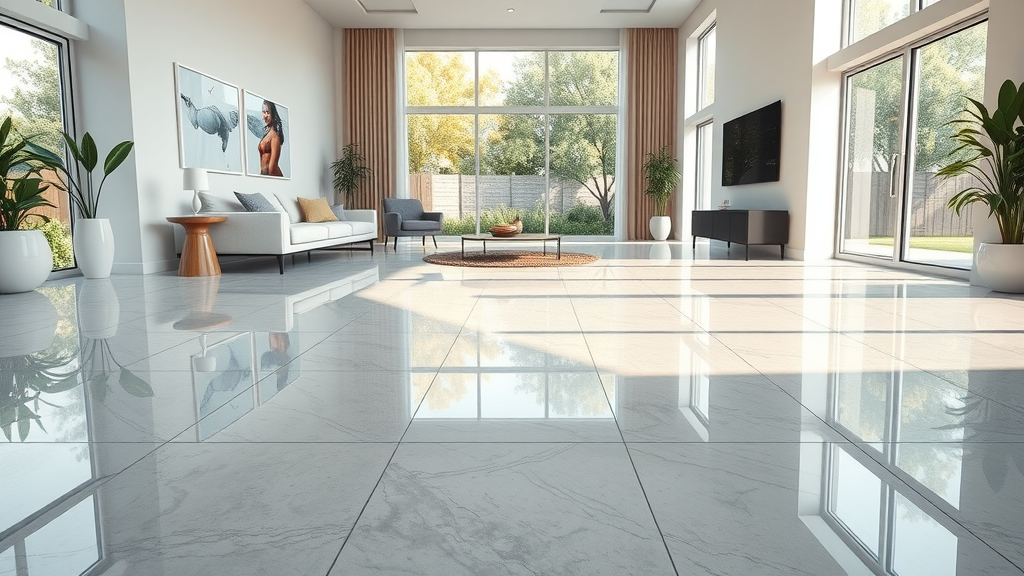
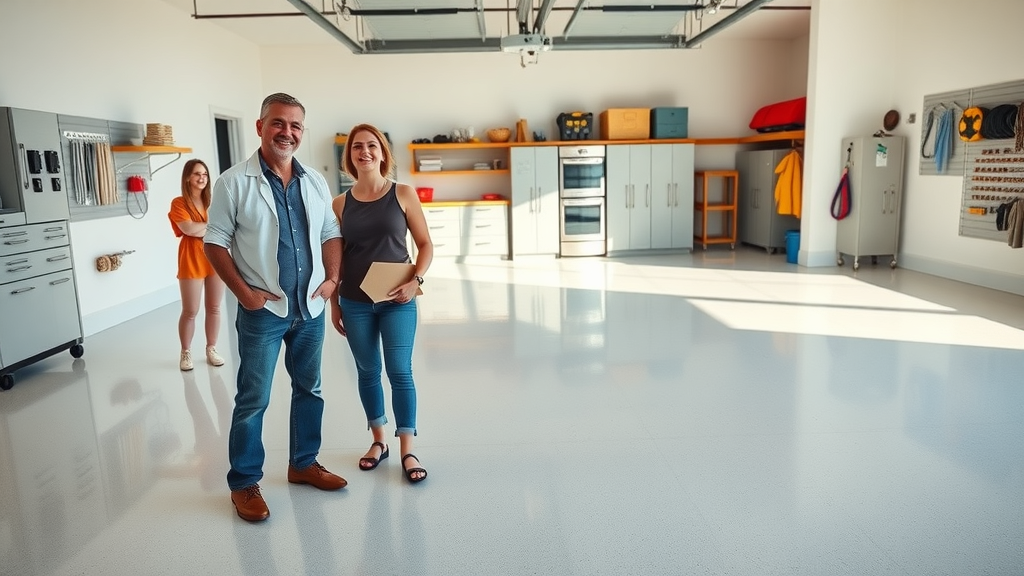
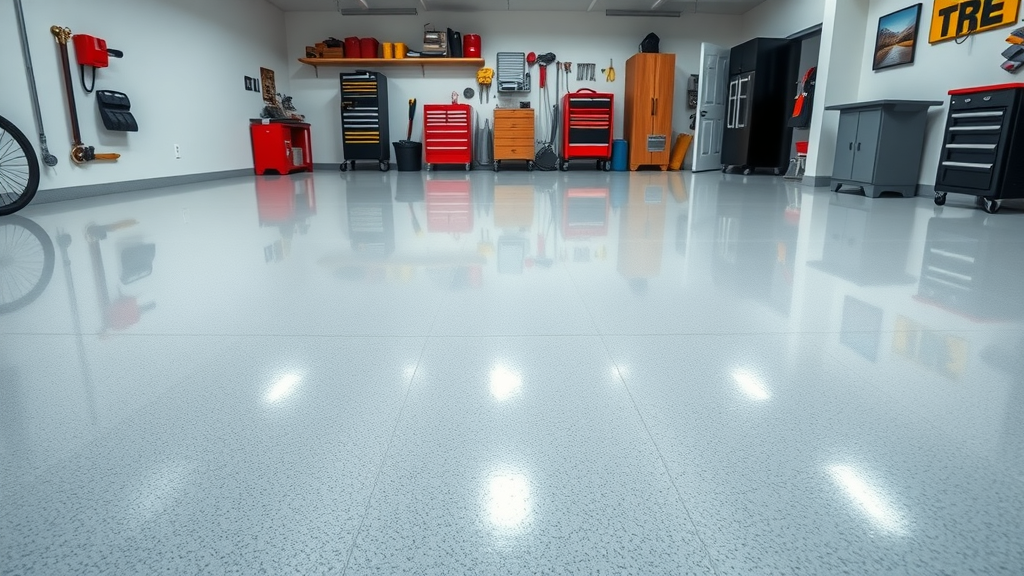
Write A Comment